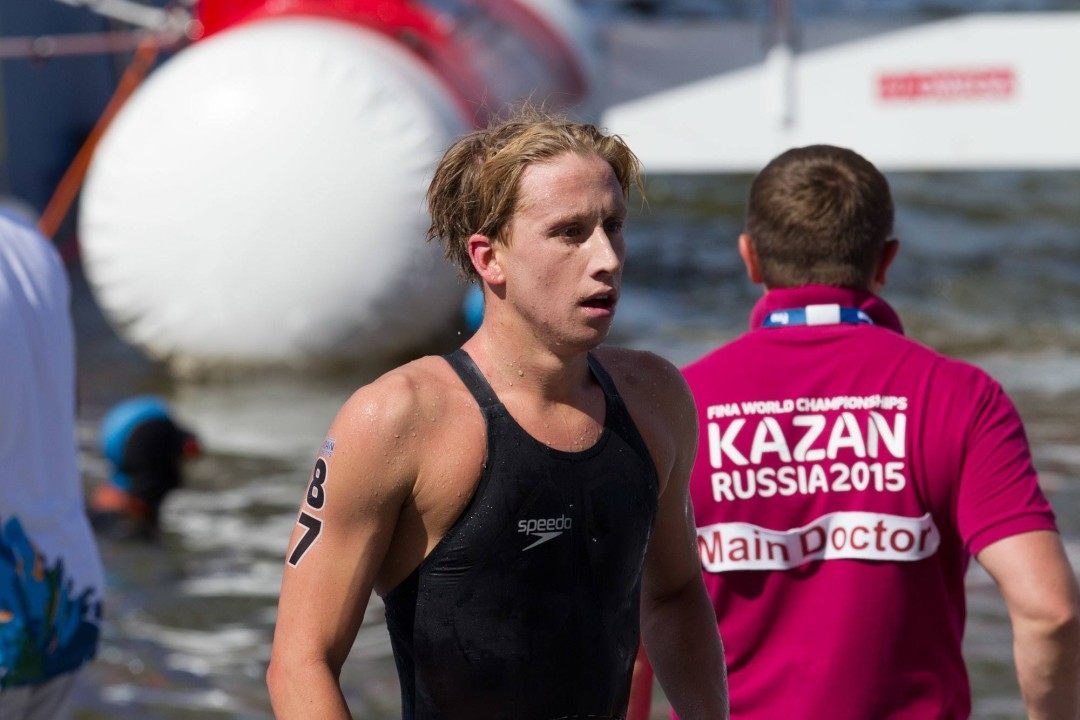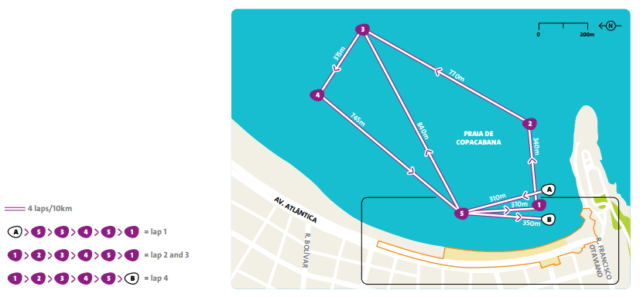Rio 2016 Olympic Open Water Swimming
- August 15th-16th, 2016
- 9AM Local Time (8AM U.S. East Coast Time)
- 10Km Race
- Fort Copacabana Beach
- Results
The Olympic open water 10km swims, referred to as marathon swimming in official Olympic parlance, will be held Monday and Tuesday off the shores of Rio’s iconic Fort Copacabana beach at the mouth of the Guanabara Bay.
Water conditions remained choppy on Sunday as swimmers made final preparations for the event, though not as bad as the 3-meter high waves that had lashed the beach the last few weeks.
Reported water temperatures in the Brazilian winter are around 21 or 22 degrees Celcius (about 70 degrees Farenheit), which is a little chilly but still warmer than the average 19.1 degree Celcius water temperature of the Serpentine where the marathon swim was held in London.
Air temperatures are expected to be around 77 degrees at the start of the race on both days with the sun showing and little-to-no expectation of rain.
The nature of the qualifying for the Olympics in the marathon swim means that the vast majority of the swimmers in the field are “names” who have a chance at competing for medals, though there are always a few stragglers who sneak in on continental qualification.
A wrinkle to any projections of this field is how well swimmers from the “last chance qualifier” did
Race Course
The Olympic race course will be along a pentagonal course (including a truncated first lap). Competitors will take 4 laps of the course to complete the 1o kilometers coming into the beach.
A temporary 5,000 seat grandstand has been set up for the event, along with a temporary media box.
Women’s Race (Monday Morning)
Start lists have been posted for Monday morning’s women’s 10 kilometer race, and there are 26 swimmers on the list instead of the standard 25. That’s because Hungary’s Anna Olasz was added to replace Anastasia Krapivina, who was barred from competing after the release of the McLaren report, but Krapivina has apparently been reinstated at the last minute (as were the rest of the Russian swimmers).
That puts two Hungarians into the race – in spite of FINA rules allowing only one swimmer per gender per country in each race unless they had two in the top 10 at the prior year’s World Championships (Hungary didn’t).
The defending 10km champion from that meet, Aurélie Muller, comes in as the de facto favorite in the race in her 2nd Olympic appearance (she swam in the inaugural open water race in Beijing, but missed London). The 26-year old was 21st in Beijing but in the last year has established herself as the best female open water swimmer in the world after switching her training to the Barbonne Swim Club. She was the 2015 European Open Water Swimmer of the Year.
Muller swam one lap of the course at the official test event earlier this year, but then bowed out, satisfied with the experience.
She’s also the 2016 European 10k champion and won the second stop of the 2016 Open Water World Cup tour by a whopping 14 seconds – ahead of a stacked field that included Brazil’s top two swimmers Poliana Okimoto and Ana Marcela Cunha, plus the Italian champion Rachele Bruni.
Okimoto and Cunha will be Brazil’s best chance at salvaging any swimming medals after the pool team failed to register a single one in front of their home crowd. Cunha took 3rd in the 10k at last year’s World Championships.
The Netherlands’ Sharon von Rouwendaal, last year’s World Championships silver medalist; and the defending gold and silver medalists Eva Risztov of Hungary and Haley Anderson of the United States will also contend on Monday. Risztov has already raced in the pool last week
Von Rouwendaal, while she was just 4th at the European Championships two months ago, was clearly the best swimmer until a wrong turn upended her result – costing her what lined up to be a dominant victory.
Men’s Race
Official men’s start lists have not been revealed yet, but presuming the 25 announced are the 25 to race (never a guarantee at these Olympics), the men’s race is even more wide open than the women’s, with nobody proving dominant over the last year.
The young upstart American Jordan Wilimovsky won the World Championship last year, and has showed that he’s in good form by swimming a best time and making the final in the 1500 in the pool last week.
But the field is loaded with veterans who understand well that their goal was to safely finish in the top 10 at Worlds. That includes Greek 36-year old Spyridon Gianniotis, one of the most decorated open water swimmers in history who won both the 2011 and 2013 World Championships before falling to bronze last year.
Dutch swimmer Ferry Weertman, the silver medalist at Worlds and 2014 and 2016 European Champion in the 10k, comes in with momentum and at 24 years old is well into his swimming prime.
Brazil also has some hope of a medal in the men’s race – Allan do Carmo. He finished 9th at Worlds last year, but has home-course advantage – which projects as a bigger advantage in open water than in the pool, especially with a more unpredictable course than London presented with the calm Serpentine waters.
Also in the field is the defending Olympic champion Ous Mellouli of Tunisia. He was a surprise to win the 10k in London, and pulled off a two-event medal performance with the 1500 in the pool four years ago. He didn’t even final in that 1500 last week, however, and while he says that he’s more tuned for open water (he’s been training with famed American open water coach Bill Rose), there are doubts about his form.
Defending bronze medalist Richard Weinberger also qualified.
How 2012 Played Out
In 2012, four of the six open water Olympic medalists came not from the 2011 World Championships qualification, rather they came from the 2012 Marathon Olympic qualifying event, despite that being only a few months before the actual Olympics.
2012 medalists:
- Ous Mellouli, Tunisia – OW Qualifier (1st)
- Thomas Lurz, Germany – Worlds (2nd)
- Richard Weinberger – OW Qualifier (2nd)
- Eva Risztov, Hungary – OW Qualifier (2nd)
- Haley Anderson – OW Qualifier (1st)
- Martina Grimaldi – Worlds (2nd)
In fact, two of the medalists (Haley Anderson and Ous Mellouli) didn’t even participate in the 10k at Worlds in 2011, and a third (Eva Risztov) was disqualified at that meet. There seems to be some sense of momentum in play here, especially in 2012 where many traditional pool distance swimmers were still just testing the waters of the marathon swim.
Generally speaking, most of the high finishers at the Olympics qualified through the World Championships, but those who rose to the top of that pile were coming through the qualifier.


Does anyone know if Poliana Okimoto is a relation to Tetsuo Okimoto, 1952 Olympix mens 1500 swimmer?
Three last lap quick ladier are Arevalo, Xie and Araouzo. Perhaps they are gone by then, but else they could surprise.
The difference in height her is also the biggest in the games. Perle is 158 and Horner 180. Perle is one of the swimmers able to travel at highest velocity related to her body length. She must ve doing something good.
But what about the polluted poop water?
Crush it, Jordan!